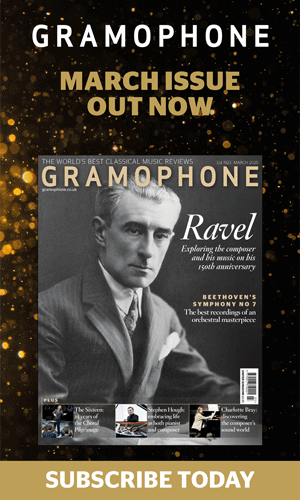Penderecki remembered
SponsoredThursday, November 25, 2021
Podcasts, tree-planting and an in-depth digital platform – Charlotte Gardner on how the composer’s legacy is being celebrated and shared today

There’s a moment, just under four minutes into Penderecki’s lushly scored, intensely Romantic-feeling Symphony No 2 of 1980, when after a tensely swirling crescendo up to a distraught climactic shout, the music ceases its struggle and subsides to a single, exhausted, held note in the brass. Tonality has been unstable, but that note is distinctly minor in feel, and the atmosphere of bleak despair feels insurmountable. Yet Penderecki has a surprise in store, because soft clarinets suddenly arrive, lift that note, and use it instead to intone the warm, serene, major-keyed first line of the carol, Silent Night. And so begins a symphonic battle between darkness and light, its language both clearly 20th century, and clearly indebted to 19th century symphonic tradition, which couldn’t be more different to the horror-filled, experimentally avant garde Threnody to the Victims of Hiroshima with which Penderecki had launched his career 20 years previously.
‘Few composers have made it such a career-defining mission to use their music to reflect and comment on world events’
All of which is to say what a fascinating and often intense musical journey it has been for me to prepare and present for the Adam Mickiewicz Institute five podcasts on Penderecki’s music, alongside five more by my journalist colleague Jack Pepper, to mark what would have been Penderecki’s 88th birthday on November 23, had he not died on March 29, 2020. Few composers have undergone such a profound stylistic shift as Penderecki of the course of their career, while nevertheless retaining their essential linguistic DNA. Few composers have made it such a career-defining mission to use their music to reflect and comment on world events. And consequently, a defining feature of our podcasts is the degree to which each of them is as much a political and social exploration of Penderecki’s world – a life lived in Poland which saw him old enough to witness the Second World War’s horrors, followed by over 40 years of struggle under Communist rule – as it is a musical one.
From Jack we have podcasts on: how Penderecki’s Polish Requiem charts Poland’s troubled history; how his String Quartet No 3 was a reaction to the events of the Second World War; a look at Aulodia and Ekecheiria in the context of Penderecki being a commissioned composer for the 1972 Olympic Games in Munich, and his wider use of electronic music; a celebration of Penderecki’s score to the classic Polish film, The Saragossa Manuscript; using Symphony No 7 as the starting point to discussing Penderecki’s aforementioned radically varied musical language. My own five then begin with Threnody to the Victims of Hiroshima, followed by a return to the impact of Penderecki’s personal wartime experiences via his rarely performed Brigade of Death for narrator and electronics; the St Luke Passion, and Penderecki’s attitudes to sacred music; an exploration of Penderecki on the operatic stage through his two chief operas, The Devils of Loudun and Ubu Rex; a celebration of Penderecki’s rich creative partnership with the violinist Anne-Sophie Mutter, focussing on his second violin concerto, Metamorphosen.
The podcasts aren’t the only element to the birthday celebrations, though. Penderecki’s other major passion was for botany. He had channeled that passion into nurturing an extensive garden in Lusawice, and the Adam Mickiewicz Institute has now used 3D laser scanning technology to create the Penderecki’s Garden project: a constantly expanding, immersive online version of the real thing which allows you to take a dreamlike virtual walk through its landscape to the soundtrack of Penderecki’s music, with the option of stepping into portals for deeper explorations of his works and biography, and filmed performances. Just visit pendereckisgarden.pl/en to see what I mean.
Back in the physical domain meanwhile, the Institute has partnered with Polish diplomatic missions around the world to plant real trees in Penderecki’s memory. For 2021, that’s meant trees for the Meise Botanic Garden in Brussels, Ottawa’s Confederation Park, Leipzig’s Augustusplatz, Kaunas Botanical Garden in Lithuania and, later this year Bangkok’s Lumpini Park. On November 23 itself, the composer’s birthday,a tree is due to be planted at Singapore’s The Fullerton Hotel.
All in all, it’s quite the birthday celebration. Also one that I suspect would have touched Penderecki very much. Especially the trees.
Discover Penderecki’s Garden: pendereckisgarden.pl







